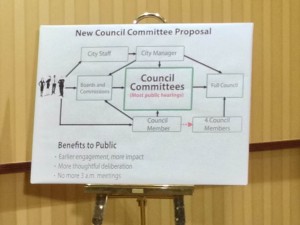It’s a new era for the Austin City Council in more ways than one. Not only does the Council have geographic representation for the first time ever, but the almost entirely new Council (Kathie Tovo is the only returning member) has proposed a significant overhaul to the way in which the body does its job. These changes were presented at a press conference with all 10 Council members and Mayor Adler last Thursday.
The proposed changes are in response to several often repeated complaints. The first is that Council meetings are unreasonably long – an average of 9 and a half hours in 2014, according to a city auditor report. This results in some Council decisions being made late at night after a full day on dais. The second complaint is that there is little to no certainty about when any specific item will be taken up at Council meetings. Coupled with the long meetings, this means that members of the public who wish to speak on an item have a difficult time doing so because can’t spend all day at a Council meeting.
A third concern is that by the time an item comes up at a Council meeting most, if not all members have already made their decisions and that speaking for or against an item isn’t likely to change the outcome of the vote. This perception (along with the time commitment required to participate) likely discourages many from showing up to share their views.
 Council’s proposals are intended to address these complaints head on by expanding opportunity for public input earlier in the process and reducing the length of Council meetings.
Council’s proposals are intended to address these complaints head on by expanding opportunity for public input earlier in the process and reducing the length of Council meetings.
Instead of most items going directly to the full Council for consideration, most items would first be assigned to a committee and would receive a public hearing in committee. The larger number of proposed Council Committees should reduce the length of any one meeting and make it more feasible for members of the public to participate. Time sensitive items or items that don’t receive timely attention in their assigned committee could still be sent directly to the full Council. And even if an item received a hearing in committee, any 4 Council members could still request a second hearing before the full Council.
Council has also proposed to assign certain topics, such as zoning to meetings that will focus on those issues, in order to allow members of the public to more easily hone in on which meetings they want to attend. Executive sessions would generally be reserved for a special meetings to keep meetings flowing and waste less of the public’s time.
As advocates of good government, Public Citizen supports these proposals and has just a few suggestions:
- The Council Committee on Austin Energy should remain a committee of the whole – with all Council members, including the mayor, serving on it. Austin Energy is the City’s most valuable asset, accounts for a majority of budget allocations and contributes significant revenue to the city’s general fund, which pays for the bulk of the city’s services, such as parks, firefighters, and libraries. In 2013, the public spoke clearly in favor of Council retaining control over Austin Energy, instead of transferring governing authority to an unelected board. Since Council serves as the board of directors for Austin Energy, all Council members should be fully engaged in governing the utility.
- A subcommittee of the Committee on Austin Energy should be created to study and propose options for modernizing Austin Energy’s business model. The mayor and several other Council members have indicated that they wish to find ways for Austin Energy to remain viable in the long run. One significant challenge is an eventual future when many more customers will have their own solar systems on their homes and businesses and will purchase less energy from the utility, but will still rely on the utility to maintain a working power distribution grid. Utilities in other states and countries are beginning to tackle the problem of retaining sufficient revenue while selling less electricity. Establishing an Austin Energy Business Model subcommittee will ensure that Council is focused on ensuring the long-term financial stability of Austin’s most valuable asset.
- Council should stet an expected timeline for holding public hearings on items that are assigned to committees. We suggest that a public hearing should be held within 30 days of an item being assigned to a committee. This will ensure that the committee process fosters meaningful and timely public engagement, as it is intended to do.



